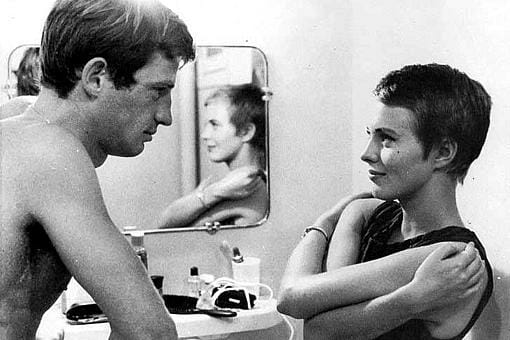By Peter Wertz · May 30, 2011

There's a fine line between the reckless innovation of New Wave directors and sloppy filmmaking. In the moment, these dramatic departures from the standard must have been thrilling, but with 60 years of film bridging the gap, it's not hard to see that a film like Breathlessis flawed. But it's also explicitly clear that perfection is besides the point. Apart from the fact that this is Jean-Luc Godard's first film, Breathless isn't meant to be anything more than a joyous expression of youth; an homage to the impulse. It is a bright mélange of joy and frustration, violence and noise, action and reaction, love and longing, and aimlessness; and while no one can deny Godard's talent behind the camera, there's something that seems wonderfully serendipitous about his first and most notable film.
Michel Poiccard (Jean-Paul Belmondo) is a chain-smoking scammer, a charming car-thief turned murderer after a hasty shooting of a motorcycle cop. Nothing seems to phase Michel, save the beautiful American Patricia Franchini (Jean Seberg). She serves as the thoughtful existentialist to foil Michel's impulsive pragmatist, and together the two run from the law and attempt to identify the truth of love. Breathless pulls a lot of drama from its central crime, with detectives always just on the heels of Patricia and Michel. But this is not a crime drama, however it may be labeled. This is a film devoted to its characters and their passions. Michel the mover, constantly looking forward to his next venture, phone call, newspaper, crime. He is recklessly impulsive, and views his relationship with Patricia as a persistent moving towards or away from. What he calls "love" is truly lust, though the purity of it and the ability it has to drive all other thoughts from his head make it perhaps the closest he will ever be to real love. As for Patricia, she is pensive and considerate, more inclined to envision scenarios than act on them. But like so many women on black-and-white celluloid, she is far more impressed with action then she would ever admit, and quickly becomes a more than willing participant in Michel's flight.
Determining the purpose of Michel and Patricia's relationship from a filmmaker's point of view is perhaps the film's greatest challenge, as they're both terribly fickle and self-involved. If there's a point to the affair, it must be to define Patricia as a woman of the 1960s. The film isn't feminist so much as it is just generally progressive, and the character of Patricia is surely suggestive of modified sexual roles. But Patricia is too a young woman in the year 1960, and her liberation is reached only to a point. The reality is, Godard probably wasn't as concerned with a penultimate read on his central characters. The film was shot messily, with a small hand-held camera, and lines of dialogue written on set just prior to shooting. Godard once said, "All you need for a movie is a gun and a girl," and it is this sentiment more than any other that seems to drive Breathless. He isn't concerned with theme or development, or at least, not nearly so concerned as he is with passion and motivation. His goal here is to let two young people loose on each other, and see how they will respond. Interestingly, what defines both of them is not how they treat one another, but the way every interaction brings only self-reflection. Immaturity is hopelessly entwined with ego, and Michel and Patricia both are driven by ego. In the film's final exchange between the two, which is actually more dueling monologues than back-and-forth, both characters delve into the unbalanced reality of their "relationship." In essence, they both come to an awareness that it is not the other whom they are invested in, but their own selves. Though they are passionately bound, they each want only a reflection of their self, not a counter.
Breathless as a first film is cocky as a hell, which surely has something to do with its success. Filmmaking must be either self-assured or unequivocally brilliant, and I don't think you can say the latter about this film. It's beautiful and intriguing, and the kind of film a person should find just at the tail end of high school, when they still have so much to learn about life but imagine they know everything. You could articulate an entire genre based on youthful ideologues and know-it-alls, and within it you would find Breathless in the company of compositions like Catcher in the Rye and The Strokes' Is This It? The fact is, there will always be room for work like this, because there will always be a generation that feels as though they are on the cusp of a great truth.